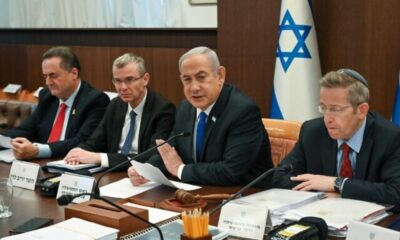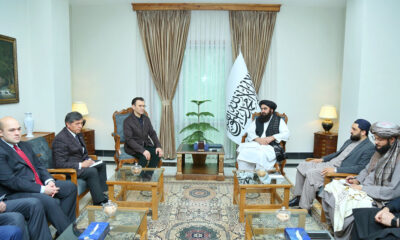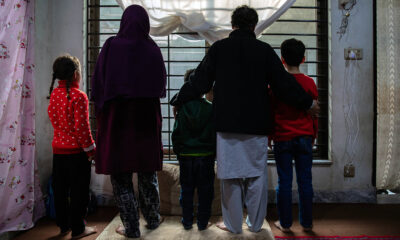Regional
US shoots down Turkish drone over Syria

The Pentagon said Thursday the U.S. military shot down an armed Turkish drone that came within 500 meters (yards) of American troops in northeastern Syria, in a rare use of force by one NATO member against another.
Air Force Brig. Gen. Patrick Ryder, the Pentagon press secretary, called it a “regrettable incident” and said U.S. troops were forced to go to bunkers for safety as Turkey bombed targets nearby, the Associated Press reported.
Both Defense Secretary Lloyd Austin and the new Joint Chiefs chairman, Gen. CQ Brown, spoke with their Turkish counterparts quickly after the incident to emphasize the value they place on their relationship with Turkey — but also the need to avoid any similar incidents in the future and ensure the safety of U.S. personnel.
The decision to shoot down an ally’s armed drone “was made out due diligence and the inherent right of self-defense to take appropriate action to protect U.S. forces,” Ryder said, adding that “we have no indication that Turkey was intentionally targeting U.S. forces.”
U.S. officials earlier told The Associated Press the shootdown was ordered after more than a dozen calls to Turkish military officials stating that U.S. forces were on the ground in the area and that the U.S. military would take action to protect them if the drone didn’t leave. The officials spoke on condition of anonymity to provide details of a sensitive military incident.
Ryder said U.S. forces observed Turkish drones doing airstrikes around Hassakeh at about 7:30 a.m. local time, and some strikes were inside a so-called American “restricted operating zone” just a kilometer (about a half mile) from U.S. troops. He said a bit later a Turkish drone re-entered the restricted area “on a heading toward where U.S. forces were located.”
Commanders determined it was a threat and U.S. F-16 fighter jets shot it down around 11:40 a.m., Ryder said, adding that no U.S. forces were injured.
The incident occurred on the same day as a drone attack killed at least 80 peoplein government-controlled Homs, Syria, where explosive-laden drones were detonated during a military graduation ceremony attended by young officers and their families. An additional 240 people were injured, according to Syria’s health ministry.
Syria’s military blamed insurgents “backed by known international forces,” without naming any particular group, and threatened to respond with “full force.”
Syria has been in a civil war for more than a decade, and the country is split into areas controlled by the Syrian government led by President Bashar al-Assad; al-Qaida-linked militants and Turkish-backed opposition fighters in the northwest; and Kurdish forces in the northeast that the U.S. partners with to conduct missions against the Islamic State group. So far, the war has killed half a million people, wounded hundreds of thousands and left many parts of the country destroyed.
Typically, the U.S. and Turkish militaries, which are NATO allies, work in close coordination in conducting air maneuvers. But Turkey considers the Kurdish forces that work with the American troops to be aligned with the Kurdistan Workers’ Party, or PKK.
The U.S. has about 900 troops in Syria conducting missions to counter Islamic State group militants.
There was no immediate comment from Turkey on the shooting of the drone.
Regional
Arab states condemn Israel’s move to expand powers in occupied West Bank
Israel’s security cabinet approved measures that will make it easier for Jewish settlers to purchase land in the West Bank and grant Israeli authorities greater powers in areas under Palestinian control.
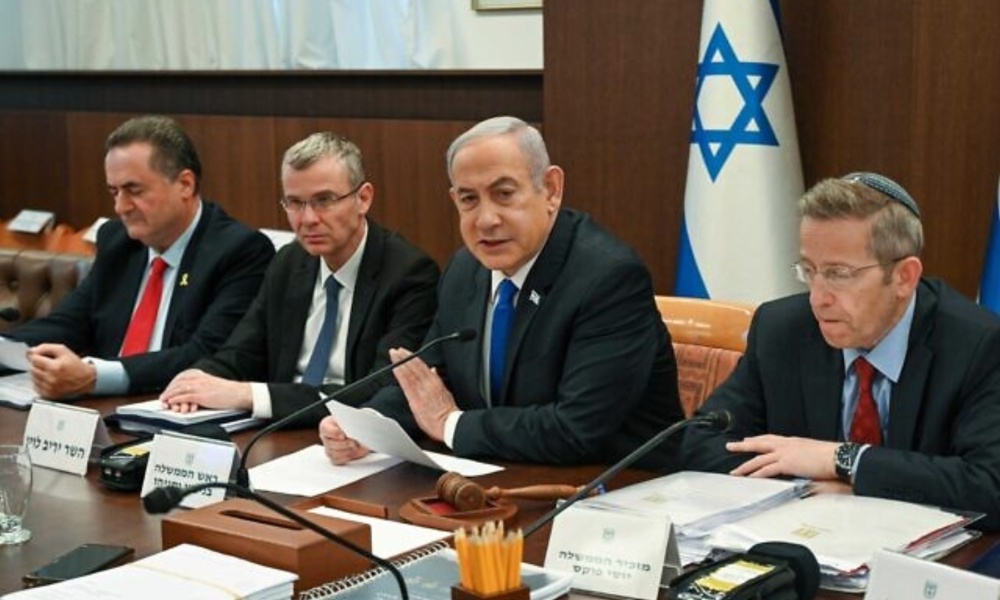
Saudi Arabia, Jordan and the United Arab Emirates led regional condemnation on Monday of Israel’s decision to ease settlement expansion and broaden its authority across the occupied West Bank, a move critics say amounts to de facto annexation.
Israel’s security cabinet approved measures on Sunday that will make it easier for Jewish settlers to purchase land in the West Bank and grant Israeli authorities greater powers in areas nominally under Palestinian control, Reuters reported citing two senior Israeli ministers.
Finance Minister Bezalel Smotrich, an ultranationalist figure in Prime Minister Benjamin Netanyahu’s coalition, said the decisions would “continue to kill the idea of a Palestinian state.”
In a joint statement, foreign ministers from several Middle Eastern and Muslim-majority countries — including Egypt and Turkey — denounced the measures as illegal under international law and warned they would undermine prospects for a two-state solution and regional stability.
Jordan, Egypt, the UAE and Turkey all maintain diplomatic ties with Israel, while Saudi Arabia has said it will not normalise relations without the establishment of a Palestinian state.
Most countries view the West Bank, occupied by Israel since 1967, as the core of a future Palestinian state.
Israeli Defence Minister Israel Katz and Smotrich said the cabinet had repealed a pre-1967 Jordanian-era law that kept land registries confidential and scrapped a permit requirement for land purchases, steps they said would simplify transactions for Jewish buyers.
Settlement watchdog Peace Now said the move violated international law and marked a significant step toward annexation. “This treats the West Bank as normal Israeli territory rather than occupied land,” said Hagit Ofran of the group.
The cabinet also expanded Israeli enforcement powers over water use, archaeological sites and environmental issues into Areas A and B of the West Bank — zones that, under the 1993 Oslo accords, are under Palestinian or joint control. Peace Now said the changes could pave the way for wider demolitions of Palestinian property and further restrictions on Palestinian development.
U.N. Secretary-General Antonio Guterres expressed “grave concern,” warning the measures were eroding the viability of a two-state solution, his spokesperson said.
In Hebron, Palestinians said the decisions would accelerate settlement growth and home demolitions. “It becomes easier to confiscate land, expand settlements and demolish Palestinian homes,” said Issa Amr of the group Youth Against Settlements.
Regional
Iran arrests at least four reform front politicians
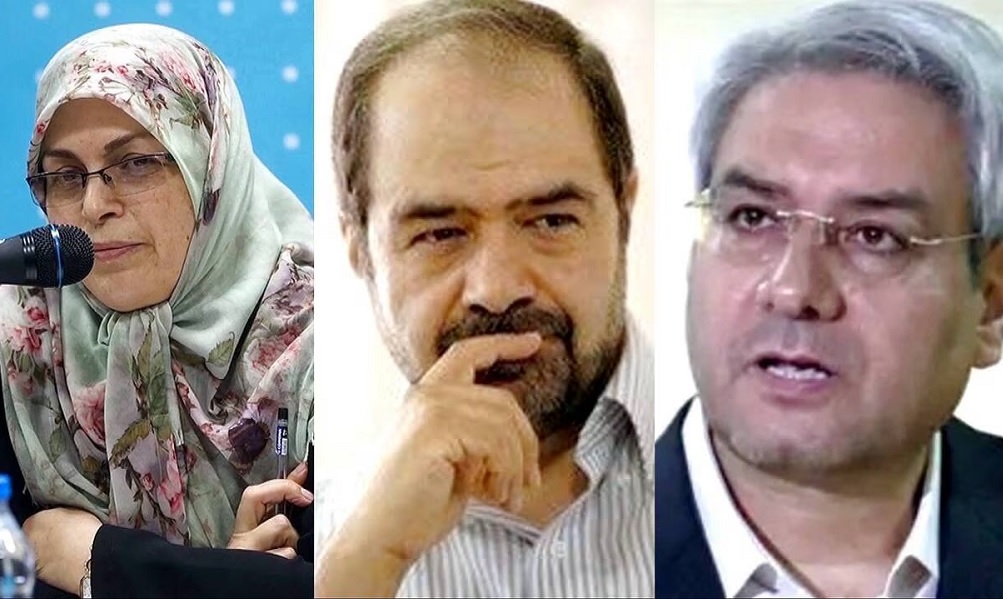
The Islamic Iran Nation’s Union Party sought the release of secretary-general Azar Mansouri, the Shargh newspaper said on Monday, after her arrest along with other members of the Reform Front, an umbrella body of Iranian reformists and moderates.
A campaign of mass arrests and intimidation has led to the arrests of thousands as authorities seek to deter further protests after last month’s crackdown on the bloodiest unrest since the 1979 Islamic Revolution.
On Sunday, state media said three senior figures from Iran’s Reform Front were arrested, among them Ebrahim Asgharzadeh, Mohsen Aminzadeh, and Azar Mansouri, who acts as the front’s head, according to Reuters.
Shargh said at least two more Reform Front members were asked to report to the prosecutor’s office in Tehran’s Evin prison on Tuesday.
The Reform Front’s spokesperson, Javad Emam, was also arrested, Mansouri’s lawyer, Hojjat Kermani, said on Monday, adding that it was unclear what charges faced those detained.
“We basically don’t know what caused these arrests, because the Reform Front has not yet issued a statement about the recent events (protests),” Kermani told the Iranian Labour News Agency (ILNA). “Individuals may have commented on their own.”
On Sunday, the judiciary’s media outlet Mizan said “four important political elements supporting the Zionist (regime) and the United States” were indicted, but gave no details.
Tehran has blamed unrest-related violence on “rioters and armed terrorists” it says were backed by its key enemies, Israel and the United States.
Past Reform Front statements have been highly critical of authorities. After the 12-day war against Israel, its members warned that “incremental collapse” awaited the country if it did not adopt fundamental reforms.
Kermani said the recent arrests were not related to a judicial case launched against the Front after that statement, however.
Regional
Eight killed in explosion in northern China, state media says

An explosion at a small biotech company in northern China early Saturday killed eight people, China’s state media reported on Sunday.
The explosion occurred in Shuoyang in the Shanxi province in the early morning of Saturday, state media reported, according to Reuters.
The legal representative of Jiapeng Biotechnology has been detained and the city has set up an accident investigation team, Xinhua News Agency reported.
The firm is located in a mountain hollow and dark yellow smoke was seen billowing from the accident site, Xinhua said.
Reuters was not able to contact the company, which does not maintain a website. The cause of the reported explosion was not immediately clear.
Founded in June 2025, Jiapeng Biotechnology conducts research on animal feed, coal products and building materials, according to its corporate registration.
-

 Latest News3 days ago
Latest News3 days agoAfghanistan to grant one- to ten-year residency to foreign investors
-

 Sport4 days ago
Sport4 days agoIndonesia shock Japan to reach historic AFC Futsal Asian Cup final
-

 Sport5 days ago
Sport5 days agoMilano Cortina 2026 Winter Olympics: What You Need to Know
-

 Sport3 days ago
Sport3 days agoIran clinch AFC Futsal Asian Cup 2026 in penalty shootout thriller
-

 Latest News3 days ago
Latest News3 days agoAfghanistan says Pakistan is shifting blame for its own security failures
-

 International Sports2 days ago
International Sports2 days agoWinter Olympics gain momentum as medal table takes shape
-

 Latest News5 days ago
Latest News5 days agoAfghanistan facing deepening hunger crisis after US Aid Cuts: NYT reports
-
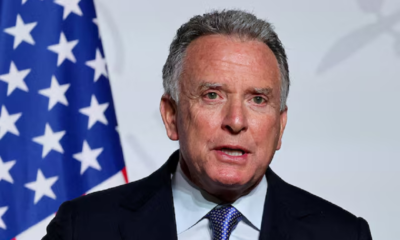
 World5 days ago
World5 days agoUS, Ukraine, Russia delegations agree to exchange 314 prisoners, says Witkoff








